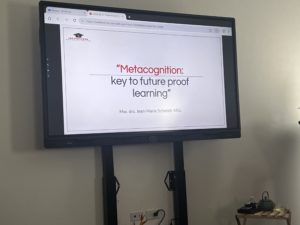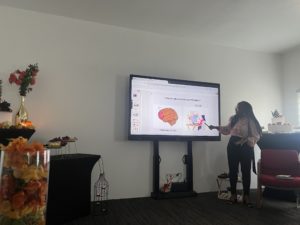
The Influence of Metacognition and Educational Leadership on Future Learning
“A cup of tea is an excuse to share great thoughts with great minds” by Cristina Re
Three years ago, a Tea lounge on Education was launched Mrs. Lilia Aventurin-Hodge, the Director of Foundation Catholic Education St. Maarten introduced a pioneering initiative in the field of education. This innovative initiative assembles educators and enthusiasts for monthly gatherings, fostering the exchange of experiences and knowledge. The main objective is to encourage open discussions on a wide array of educational topics, raise awareness, share best practices, and enhance the quality of education across all Catholic schools.
The Tea lounge on Education attracts a diverse group of participants, including School Leadership, Invited Guests, Entrepreneurs, Students/Youths, and professionals, facilitating a rich exchange of ideas and experiences that enrich the discussions on education and leadership.
In the words of Mrs. Aventurin-Hodge, a Tea party or gathering historically often symbolizes the beginning of a movement aimed at driving change and improvement. In this case, the Tea lounge serves as a symbol of change in the field of holistic development, underlying the importance of collaboration within professional learning communities.
The most recent Tea lounge session, held before the October break, featured a guest presenter, Dr. Jean Marie Schmidt, an associate professor in Academic Success, Educationalist, Author, and TedX speaker affiliated with the Rotterdam University of Applied Sciences. Dr. Schmidt’s presentation emphasized the pivotal role of metacognition in educational leadership and its significance for future learning.
In a compelling presentation, Dr. Jean Marie Schmidt, an esteemed expert in the field of Educational Leadership, shed light on the paramount importance of metacognition in shaping the future of learning. Metacognition, the ability to think about one’s thinking, is a fundamental cognitive skill that holds the key to unlocking the potential of educational leaders and learners.
Educational leadership plays a critical role in shaping the educational landscape. As educational institutions evolve to meet the ever-changing needs, it becomes imperative for leaders to adopt innovative strategies. Dr. Schmidt emphasized that effective educational leadership is not just about managing institutions but about driving meaningful change that fosters lifelong learning and prepares individuals for a rapidly changing world.
Her presentation highlighted metacognition as the driving force behind effective educational leadership. Metacognitive skills encompass self-awareness, self-regulation, and reflection, which are essential for educators and learners to thrive in today’s complex and dynamic educational environments.
Dr. Schmidt’s research underscores the critical importance of metacognition in effective pupil learning, empowering learners to achieve higher levels of academic success, become more adaptable in independent learning, develop resilience, and experience increased social-emotional growth.
In her presentation, Dr. Schmidt addressed the education challenges expected in 2024 and beyond. She pointed out the increasing global gap in socioeconomic status among students, raising questions about the inclusivity and accessibility of education.
Dr. Schmidt also highlighted the challenges posed by the economic instability, psychological issues among children, and the strain on parents and teachers, necessitating a reevaluation of how educators manage education in an increasingly complex world.
Traditional academic approaches were brought into question as Dr. Schmidt discussed the past 50 years, highlighting the need for a comprehensive understanding of interventions implemented over the years.
Another critical issue discussed was the motivation crisis experienced by students. Dr. Schmidt challenged the common perception of students as merely “unmotivated” and emphasized the distinction between “unmotivated” and “demotivated” students, urging researchers to explore the psychological factors contributing to demotivation.
Dr. Schmidt proposed the importance of changing mindsets and the educational system that shapes them. She underscored the correlation between mindset and achievement, urging educators and parents to recognize the importance of students’ beliefs about intelligence and learning.
Dr. Jean Marie Schmidt’s presentation at the tea lounge emphasized the significance of metacognition in educational leadership and the need to address critical challenges in education. As the world evolves, education must adapt to meet the needs of all learners and foster a love for meaningful, purposeful work.
The Tea lounge on Education serves as a catalyst for change, inspiring education professionals to reshape the future of learning and ensure that every child has the opportunity to contribute to the world with happiness and purpose. Management and Educators of Catholic schools had follow-up sessions with Mrs. Schmidt before the October break.
Interviews with Mrs. Schmidt on Meta cognition, Social Emotional learning. Homework and more will be published in the coming weeks on our Blog page.


















